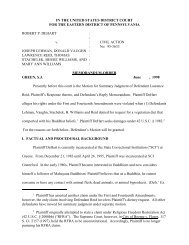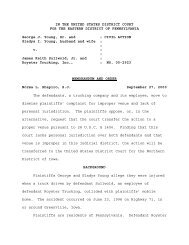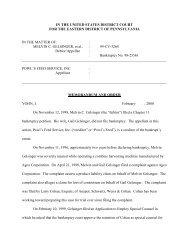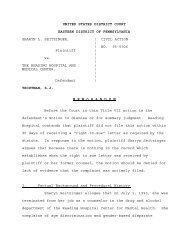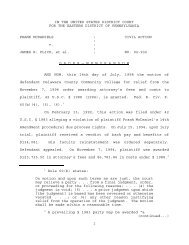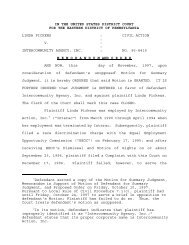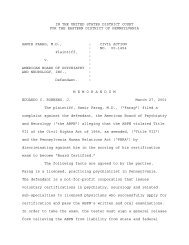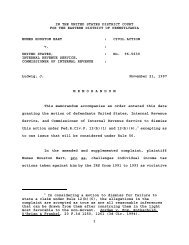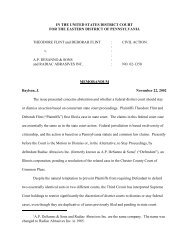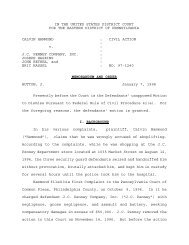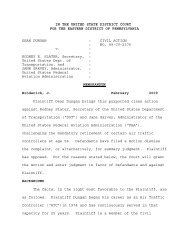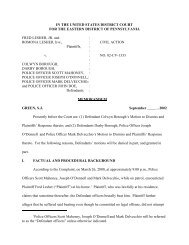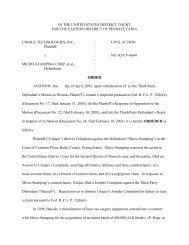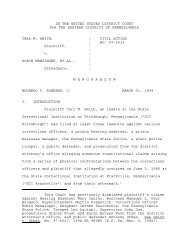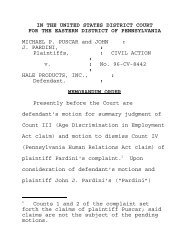united states district court - Eastern District of Pennsylvania
united states district court - Eastern District of Pennsylvania
united states district court - Eastern District of Pennsylvania
You also want an ePaper? Increase the reach of your titles
YUMPU automatically turns print PDFs into web optimized ePapers that Google loves.
arguing that it is a claim <strong>of</strong> fraud in the inducement barred by the parol evidence rule. 32 QVC argues<br />
that Starad relies on inadmissible parol evidence, mere allegations and inadmissible hearsay.<br />
Under <strong>Pennsylvania</strong> law, “the parol evidence rule bar[s] consideration <strong>of</strong> prior<br />
representations concerning matters covered in the written contract, even those alleged to have been<br />
made fraudulently, unless the representations were fraudulently omitted from the contract.” 33 This<br />
rule permits admission <strong>of</strong> prior representations where a party alleges fraud in the execution, such as<br />
where “the parties agreed that those representations would be included in the written agreement but<br />
were omitted by fraud, accident or mistake.” 34 Fraud in the inducement “does not involve terms<br />
omitted from an agreement, but rather allegations <strong>of</strong> oral representations on which the other party<br />
relied in entering into the agreement but which are contrary to the express terms <strong>of</strong> the agreement.” 35<br />
Starad responds that the parol evidence rule does not apply to its fraud claim because<br />
(1) Starad’s claim is based on QVC’s allegedly fraudulent representations about matters not covered<br />
by the Agreement, and (2) Starad alleged fraud in the execution as opposed to fraud in the<br />
inducement, an exception to the parol evidence rule. 36<br />
32 See Starad’s Compl. at 57, 58 (“QVC deliberately and actively misrepresented to [Starad] the status<br />
<strong>of</strong> the parties’ relationship and other facts material to the decision <strong>of</strong> [Starad] to enter into the Sweater Agreement<br />
and grant to QVC an exclusive license thereunder. [Starad] reasonably relied on this false information to its<br />
detriment, and [was] thereby induced to enter into the Sweater Agreement and grant to QVC an exclusive license<br />
thereunder.”)<br />
33 Dayh<strong>of</strong>f, Inc. v. H.J. Heinz Co., 86 F.3d 1287, 1300 (3d Cir. 1996).<br />
34 1726 Cherry St. P’ship v. Bell Atlantic Prop.’s, 653 A.2d 663, 666 (Pa. Super. 1995).<br />
35 Dayh<strong>of</strong>f, 86 F.3d at 1300.<br />
36 Starad also argues that summary judgment is inappropriate because it needs to conduct depositions <strong>of</strong><br />
QVC employees who submitted declarations to this Court, to explore the “factual dispute” regarding QVC’s<br />
employees’ representations to Starad about QVC’s devotion to Starad’s brand and the Agreement. Starad’s Reply in<br />
Opp. to QVC’s Mot. at 11; see also Starad’s Sur-Reply in Opp. to QVC’s Mot., at 9-10. Discovery is now<br />
completed, and neither party has moved this Court for leave to conduct additional discovery or to file supplemental<br />
-17



